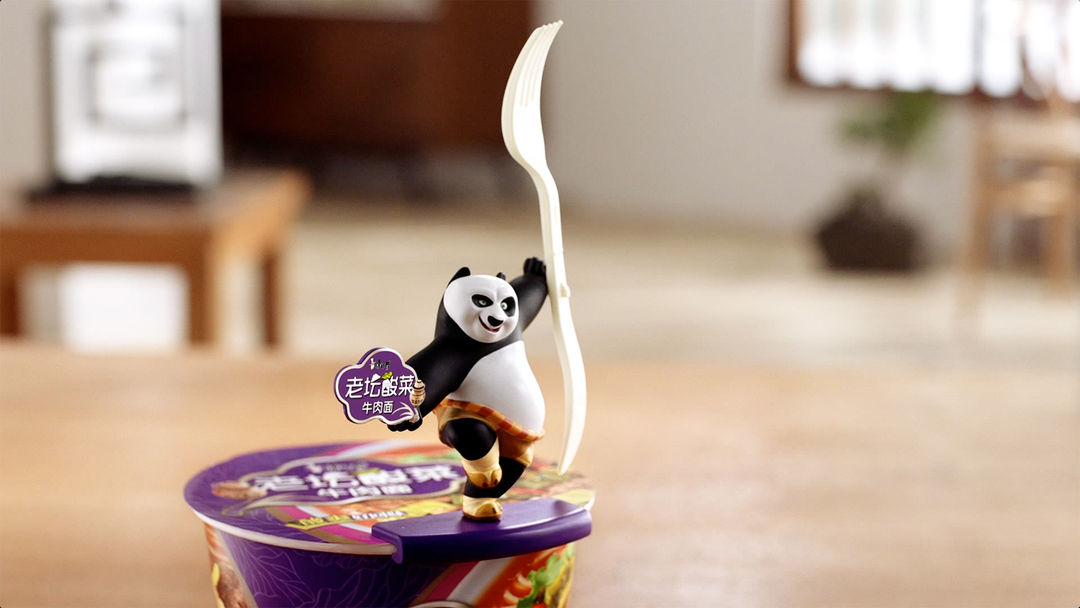When Xu Lei, a young entrepreneur, managed to secure rights to sell official Kung Fu Panda merchandise in and around Yangzhou, a city straddling the Yangtze River in east China’s Jiangsu province, he was certain that he was on to a huge money-spinner.
The toy maker and seller had already made a living churning out Sponge Bob Square Pants, Buzz Lightyears and Optimus Primes, but this time he was hoping to cash in with plush Po’s, the star bear from the Oriental DreamWorks co-production releasing on Friday, January 29.
But days before Kung Fu Panda 3 film was due to hit cinemas in the United States and China, a glut of too-skinny, pop-eyed and simply odd-looking Po’s flooded the Chinese market.
The experience of entrepreneurs like Xu Lei provides an insight into the difficulties studios face while trying to exploit the ancillary market for movie tie-in merchandise.
Companies joining in on the RMB 1 billion-plus Kung Fu pandemonium include Volkswagen, online shopping giant Alibaba’s Tmall, Chimelong Paradise amusement park, dairy company Yili, OMO detergent, Huawei phones, Ping An Insurance Group, and NetEase games.
But the continued presence of bootleg product in China is particularly threatening for international studios from Hollywood that seek to diversify their revenue streams away from ticket sales since Chinese regulations limit their take-home share of a film’s box office gross.
A cursory search for KFP3 merchandise on Taobao, an online shopping giant like eBay, resulted in ad after ad for these not-quite-right Po’s, illustrating just how bad it is for guys like Xu Lei, who tried to do the right thing and follow the letter of the law.
“It was really difficult to secure the official rights to sell the merchandise, only to find out the market is awash with shanzhai [fake] product,” Xu told the Yangzhou Evening News.
The rush for counterfeiters to cash in on the Kung Fu Panda craze is unsurprising given the film’s history and the massive amounts of cash that have been funneled into the film’s marketing campaign.
The previous installment in the Kung Fu Panda franchise grossed $92 million in China in 2011, breaking records at the time in its opening weekend.
This time around, its earning potential is going to be magnified even further as there are two versions: one in English and another that has been reanimated to match the mouth movement of Mandarin Chinese.
Kung Fu Panda 3 has teamed up with popular instant noodles brand Kangshifu with specially branded packets. Po’s pudgy face is on Kellogg’s cereal boxes and his likeness is available for download as ‘stickers’ on the hugely popular WeChat mobile messaging service.
In China, 90- 95 percent of revenue from movies comes from box office sales and advertising. In the United States, 70 percent of revenues come from sales of things other than ticket sales such as merchandise and concessions, iiMedia Research data shows.
Yet despite the continued prevalence of fake merchandise, the market for cheap knockoffs is actually shrinking as consumer perceptions change, says Kevyn Kennedy, the founder of CBI Consulting, who has run anti-counterfeiting investigations for the past 20 years.
“With more disposable income, Chinese consumers are looking at better quality, good designs, fashion trends,” Kennedy said. ”The market for cheap knockoffs is shrinking and the difference in quality is obvious to the average consumer.”
But the fight against piracy in China often can prove an uphill battle. Counterfeits often are made in the same factories as genuine merchandise — a fact many companies simply have had to accept as part of the cost of doing business in the Middle Kingdom.
In fact it’s the “more expensive, better quality counterfeits” that are the bigger threat to foreign studios and toy makers, Kennedy said.
But while the fight against fakes remains tough, Kennedy said Chinese authorities “get it,” they understand that the protection of intellectual property (IP) is a key to China becoming a first rate economy.
Beijing has shown China can respect IP. During the 2008 Beijing Olympics, Chinese authorities went to great lengths to enforce IP protection of the Games’ ‘Fuwa’ mascots.
Now there are signs that international companies are betting that a rise in the number of increasingly sophisticated Chinese middle-class consumers combined with stricter enforcement of intellectual property laws may mean the market for official merchandise is set to grow.
Studios long have co-branded movie tie-ins with toy manufacturers and apparel companies. But now some are not just planning to sell from existing retail outlets, but through their own stores.
Twenty-First Century Fox announced this week that it would open Beijing and Shanghai stores dedicated to The Simpsons, this despite the fact the characters Homer and Bart, Marge and Lisa—from Matt Groening’s classic animated American TV series—are not particularly well known in China.
According to Jeffrey Godsick, president of Fox’s consumer products division, the company plans to open 50 stores in China by the end of 2016.
And Disney, whose house boasts characters much more recognizable to the average Chinese, has been selling its products in their own chain stores. The Shanghai Disney theme park, slated to open June 16, is expected to further boost Chinese demand for merchandise from Mickey Mouse and friends.






